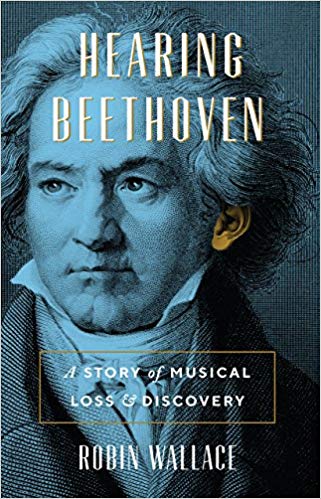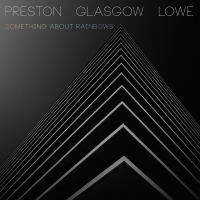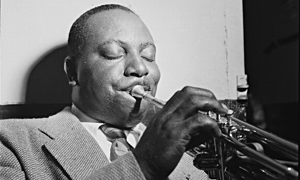Home » Jazz Articles » Book Review » Hearing Beethoven: A Story of Musical Loss and Discovery...
Hearing Beethoven: A Story of Musical Loss and Discovery by Robin Wallace
 Hearing Beethoven: A Story of Musical Loss and Discovery
Hearing Beethoven: A Story of Musical Loss and Discovery Robin Wallace
288 Pages
ISBN: # 978-0226429755
University of Chicago Press
2017
It is the artistic human-interest story to end them all. The most famous "Classical" composer spent the better part of his late composing period almost completely deaf, in the process completing a body of music unsurpassed 200 year later. The sheer Romanticism of the thought of it is almost too much to bear. Tortured genius composes pinnacle of Western Music in solitary silence. But just as Elijah Wald blew the dust off the myth of Robert Johnson in Escaping The Delta: Robert Johnson And The Invention Of The Blues (Amistad Press, 2004), so does music historian and Beethoven expert Robin Wallace illuminates the composer's hearing loss in tandem with that of his wife, creating very personal account of what it means to be human. Wallace does not so much reduce the triumph of Beethoven to the mundane as he does elevate that same primal spark within us all, the ability to adapt when challenged.
Knitting the two narratives together, Wallace takes this story of loss through a refreshingly dizzying ride through musicology, audiology, epistemology, symbology, semiotics, psychology, as well as the evolution of the piano. In one discussion regarding the "Ears, Eyes, and Mind," Wallace notes even which came first regarding perception:
"William Gladstone...did a linguistic analysis of the works of Homer and found that the colors most frequently mentioned were black and white. Other colors were clearly wrong: sheep described as violet, for example, or fearful human faces as green. Most strikingly, however, Homer never used the wordblue. In his writings, as is well known, the sea is enigmatically described as "wine dark." Subsequent study revealed that blue is similarly missing from other ancient texts, including the Bible. The sky is most frequently described as white. Only later did the word blue appear. It seems that in order for the color to be seen, the word for it had to exist first.
Apparently, in some cases, the brain has to understand something before it can see or hear it. Sensory information is not transmitted and passively received, registering somewhere in our minds. Rather, our minds actively seek it, and put their stamp on it in the very process of registering that it is there. "
Wallace uses this to illustrate how his wife, when fitted with cochlear implants, took the information that the implants provided her (imperfectly, in our hearing estimation) and associated it with the source in such a way that she was able to have heard that sound as natural. With the cochlear implants, she could look at a dog barking and the sound that the implants imparted her would be associated with the sound that she remembered, thus rewiring her perception. This ability was undoubtedly also common to Beethoven. Additionally, there is the music as a language factor. Like most languages, there exist the written and spoken elements, or in the case of music, performed. For those borne hearing and acquiring deafness, memory will provide the "sound" of the words spoken or the musical notes played.
Wallace notes that both his wife and the composer naturally adapted to their deafness, with the remaining senses become critical to that adaptation. Wallace notes that for Beethoven and, indeed, all composers, composition is a whole-body experience that is the sum of all the parts of being human. Wallace notes:
"For Beethoven, composing music meant walking through the streets of Vienna and the surrounding countryside, music paper in hand. It involved stormy sessions and the piano in which he worked out his ideas, and others at his desk when he sketched at lightning speed or filled his manuscripts with last-minute corrections. He used the piano to the limit of its capabilities and used paper in profligate abundance. He fully exploited every physical medium available to him. For Beethoven music was always more than sound. It was a map of his inner experience, expressed outwardly through extravagant gestures, virtuosic use of the keyboard, and constant, compulsive writing and revising. Deafness was not about to derail him."
Beethoven was not a great composer because of, or in spite of his deafness. He was a great composer because he was a great composer, enormously gifted, perhaps more than any other. What he did in his so-called "late period" when he was most likely functionally deaf was the same thing he had always done...compose. Did Beethoven's deafness affect his composing? Absolutely. Did it define it? Absolutely not.
Harold C. Schonberg, former Classical Music Editor for the New York Times, described the music Beethoven's late period as follows:
"Then comes the fallow period, followed by the so-called later-period works —the last five string quartets and piano sonatas, the Diabelli Variations, the Missa Solemnis, the Ninth Symphony. Here we are on a rarefied plane of music. Nothing like it as been composed, nothing like it can ever again be. It is music of a man who has seen all and experienced all, a man drawn into his silent, suffering world, no longer writing to please anyone else but writing to justify his artistic and intellectual existence. Faced with this music, the temptation, is to read things into it in some metaphysical exegesis. The music is not pretty or even attractive. It is merely sublime."
Tags
PREVIOUS / NEXT
Support All About Jazz
 All About Jazz has been a pillar of jazz since 1995, championing it as an art form and, more importantly, supporting the musicians who make it. Our enduring commitment has made "AAJ" one of the most culturally important websites of its kind, read by hundreds of thousands of fans, musicians and industry figures every month.
All About Jazz has been a pillar of jazz since 1995, championing it as an art form and, more importantly, supporting the musicians who make it. Our enduring commitment has made "AAJ" one of the most culturally important websites of its kind, read by hundreds of thousands of fans, musicians and industry figures every month.
























